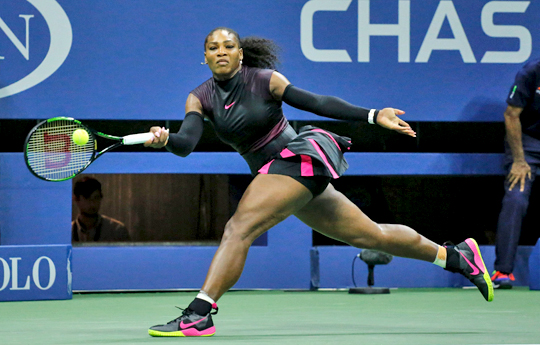New York, Sep 9: The 10-seeded Pliskova from Czech Republic upset Williams by finishing the match 6-2, 7-6 (5). This defeat also ends Williams' 3-year reign as World No. 1.

For the second year in a row, Serena Williams’ bid to make history ended with a shocking loss in the U.S. Open semifinals.
A seventh title at Flushing Meadows, which would have been an Open-era record, will have to wait. So will a 23rd Grand Slam championship, another record. And her 3-year reign at No. 1 in the WTA rankings is over, too, one week shy of what would have been yet another mark.
Undone by a half-dozen double-faults, including on match point, and dealing with an injured left knee that limited her movement, Williams was upset 6-2, 7-6 (5) by big-serving Karolina Pliskova of the Czech Republic on Thursday night.
“Karolina played great today. I think if she had played any less, then maybe I would have had a chance,” Williams said. “So I think I wasn’t at 100 per cent, but I also think she played well. She deserved to win today.”
The 10-seeded Pliskova began her on-court interview by blurting out that she couldn’t believe she’d eliminated Williams to earn a spot in her first major final. Then Pliskova changed course, saying- “I mean, actually, I do believe it. I always knew I have a chance to beat anyone if I’m playing my game.”
Missing a calender-year Slam by a whisker
At the 2015 U.S. Open, Williams’ bid for a calendar-year Grand Slam ended when she lost in the semi-finals to unseeded Roberta Vinci of Italy in one of the biggest surprises in tennis history. This one goes pretty high on the list, too.
This was the 33rd major semifinal of Williams’ career, and the first for Pliskova, who beat the 34-year-old American’s older sister Venus in the fourth round. Pliskova is only the fourth woman to beat both Williams siblings during the same Grand Slam tournament.
And to think- The 24-year-old Pliskova had never been past the third round in 17 previous appearances at majors. “I had a goal today to beat Serena. That’s what I did,” Pliskova said. “I don’t care who is there in the final.”
Williams, who refused to answer questions about the rankings, and Graf also share the mark for most Grand Slam titles since 1968, when professionals were first admitted to majors. And Williams remains even with Chris Evert with six U.S. Open trophies.
Pliskova, meanwhile, is now one victory from her first, and on Thursday night, she certainly looked the part of an up-and-comer with the strokes and demeanor to go far.
The temperature was in the low 80s, and the air was muggy and still, and Williams kept using the pleats of her black-and-pink skirt to wipe her sweaty palms between points. She flubbed shot after shot, 31 unforced errors in all.
Afterward, Williams dismissed the notion that she might have been fatigued from a gruelling three-set quarterfinal against Simona Halep that concluded less than 22 hours before the semifinal started. Instead, Williams and her coach, Patrick Mouratoglou, pointed to the left leg that she repeatedly clutched at in the second set.
“When you’re hampered, you’re thinking of other things. Like, I was making errors that I never make, and definitely I didn’t make in this tournament in particular. So many simple, simple shots that I easily could have made,” Williams said. “I just blame that on just mentally thinking about my leg and just not thinking about the shot.”
Mouratoglou was more succinct.
“She didn’t show up. She couldn’t play,” he said. “She was so slow. She couldn’t move.”
Still, Pliskova surely had a lot to do with Williams’ woes. Pliskova’s power is of the sort that Williams so rarely is forced to confront much like the difficulties the American’s own game presents others.
The 6-foot-1 Pliskova serves well, leading the tour in aces this season and averaging 109 mph Thursday, and her angled offerings gave Williams fits. Pliskova also returns well, often sending stinging responses right at Williams’ feet, leaving her no time to react properly. And when they engaged in lengthy baseline exchanges, Pliskova’s deep, flat groundstrokes were able to produce the rare sight of Williams back on her heels.
All of 7 minutes in, Pliskova showed she was not shaken by any of it the stage, the setting, the stakes or the foe and was going to make this a struggle for Williams. Getting all sorts of pace on returns, including off a 104 mph serve at break point, Pliskova quickly gained control of points. When Williams sent a backhand long, she trailed 2—1.
Williams yelled out, “Ai-yai-yai!” and slapped her left thigh.
Pliskova would go on to 10 of the first set’s last 11 points. In the concluding tiebreaker, Pliskova jumped ahead 3—0. Then came Williams, never one to back down, going ahead 5—4, just two points from forcing a third set. But she wouldn’t take another point, closing the surprising loss with another double—fault, leaving Flushing Meadows with another disappointment.





Comments
Add new comment